You are viewing the Cultures of Knowledge Blog archive for the ‘Conferences and Workshops’ Category:
Paper proposals are invited for a one-day colloquium on Translation and Translators in the Circulation of Knowledge in Early Modern Science, which will take place at London’s Warburg Institute on Friday 28 June 2013. The event ‘will explore the role of translation in early modern science, providing a forum for discussion about translations as well as the translators, mediators, agents, and interpreters whose role in the intellectual history of the period remains ill defined and deserves greater attention’. Suggested topics include the philosophy and theory of translation; the ‘professional translator’; the function and use of translations; auxiliary languages; translation in learned correspondence; the readers of translations; and informal translations (adaptations, paraphrases).
The deadline for proposals for 25-minute papers and full panels is 28 February 2013. For further details and submission instructions, see the colloquium webpage.
James Brown
November 30, 2012
Calls for Papers, Conferences and Workshops, Events, Projects and Centres
Tags: Book History, Diplomatic History, Gender, Global, History of Scholarship, History of Science, Networks, Religion, Women
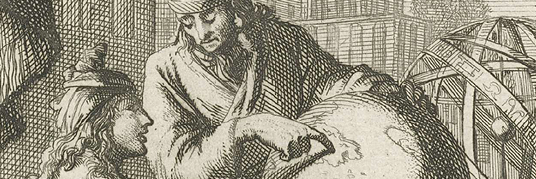 The Centre for Seventeenth-Century Studies at Durham University is seeking papers for a conference on Intellectual Networks in the Long Seventeenth Century (30 June–2 July 2013). The event – which will feature a keynote lecture from our own Howard Hotson – will ‘explore the emergence and consolidation of systems of intellectual and cultural exchange during the long seventeenth century, while assessing their lasting influence on the history of scholarship, literature, diplomacy, science, and religious communities’. Proposals are encouraged on (inter alia) erudite correspondence; academic networks; diplomacy; literary circles; intellectual exchange within religious communities; the book trade; women and intellectual exchange; and popular cultural exchange.
The Centre for Seventeenth-Century Studies at Durham University is seeking papers for a conference on Intellectual Networks in the Long Seventeenth Century (30 June–2 July 2013). The event – which will feature a keynote lecture from our own Howard Hotson – will ‘explore the emergence and consolidation of systems of intellectual and cultural exchange during the long seventeenth century, while assessing their lasting influence on the history of scholarship, literature, diplomacy, science, and religious communities’. Proposals are encouraged on (inter alia) erudite correspondence; academic networks; diplomacy; literary circles; intellectual exchange within religious communities; the book trade; women and intellectual exchange; and popular cultural exchange.
The deadline for proposals for 20-minute papers and full panels is 15 January 2013. For further details and submission instructions, head along to the conference webpage or download the flyer (pdf).
James Brown
November 26, 2012
Conferences and Workshops, Events, Project Updates, Projects and Centres, Videos, Websites and Databases
Tags: AHRC, Databases, Digitization, Union Catalogue, Visualization
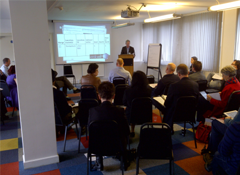
Howard mid-‘yack’
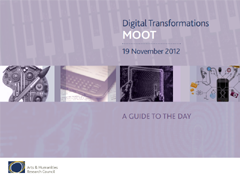
Visit event website
An outing to London last Monday when we presented Early Modern Letters Online at the Digital Transformations Moot, curated and funded by the AHRC. The day long event brought together digital humanists with thinkers and practitioners from other disciplines and sectors ‘to explore the possibilities of the Digital Transformations theme for new and exciting ways of working: to hack, to make, to break’.
The Moot did a great job of showcasing the very wide range of work (and attendant debates) currently being done at the intersection of the humanities and the technical, and in particular in highlighting and fostering new kinds of connections between digital technologies, arts and the humanities, and the creative and cultural industries (the latter being much more strongly represented than is usual at DH gatherings). It was also really interesting from the perspective of event design. Decked out in bracing, challenging terminology – debates were ‘moots’; delegates were ‘mootlings’; papers became ‘yacks’ – the day spread keynote lectures, panel discussions, software demos, and PechaKucha-style talks across multiple tracks and spaces in a kind of freeform digital smörgåsbord that rewarded curiosity and encouraged the creation of individual narratives and serendipitous connections between the sampled components. Further details on the Moot webpage, while the Twitter hashtag was #digitrans; videos of the various live streams will be posted the the webpage shortly.
The News Networks in Early Modern Europe research group is seeking papers for its terrific-sounding concluding conference on News and the Shape of Europe, 1500-1750 (Queen Mary, University of London, 26-28 July 2013). Emphasizing the transnational attributes of news networks and their superimposition on pre-existing systems of exchange (physical/logistical, commercial, religious, diplomatic, military, and scholarly), the event 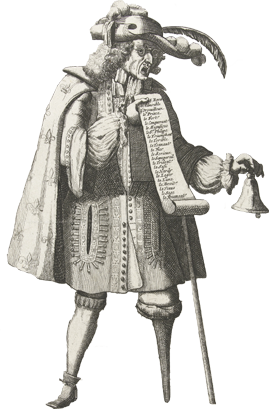 is after contributions on the following themes: ‘International news; networks of news; news in transmission; translating news; war reporting; news from beyond Europe; forms of news; orality/manuscript/print; the uses and afterlives of news; old (and recycled) news; images of news; news and institutions; news and the state; news and the city; news readers’.
is after contributions on the following themes: ‘International news; networks of news; news in transmission; translating news; war reporting; news from beyond Europe; forms of news; orality/manuscript/print; the uses and afterlives of news; old (and recycled) news; images of news; news and institutions; news and the state; news and the city; news readers’.
The deadline for 250-word proposals for communications of twenty minutes is 28 February 2013. For further information, submission instructions, and contact details, head along to the News Networks in Early Modern Europe Blog.
James Brown
October 19, 2012
Conferences and Workshops, Events, Front Page, Podcasts, Project Updates, Publications
Tags: Animals, Charles Perrault, Comte de Buffon, Francis Willughby, Frogs, History of Medicine, History of Science, Insects, John Ray, Martin Lister, Natural History, Toads
The special issue publishes the proceedings of the day conference History Comes to Life: Seventeenth-Century Natural History, Medicine, and the New Science, organized by Anna Marie at The Royal Society in April (with the financial and logistical support of the project, The Royal Society, the Wellcome Trust, the John Fell Fund, and the BSHS). It features six fresh and fascinating articles from leading authorities on a wide range of topics at the intersection of seventeenth-century natural history, medicine, and science, including Buffon and animals, Francis Willughby and insects, and Jan Swammerdam’s abiding intellectual infatuation with frogs and toads. You can now enjoy early access to the articles online; the print version of the special issue will be available at the end of November. You can also listen to the podcasts from the conference. Congratulations to Anna Marie and the rest of the contributors!
James Brown
October 16, 2012
Conferences and Workshops, Events, Front Page, Project Updates
Tags: Book History, Global, History of Scholarship, History of Science, Libraries, Networks, News, Seventeenth Century, Union Catalogue
The event, organized by Rhodri Lewis and Noel Malcolm and attended by a record audience of over 100 delegates, assembled an all-star cast of eighteen international authorities on early modern letters, who over a three-day programme explored and celebrated the ways in which intellectual interests and activities of all kinds were pursued and propagated through correspondence during the long seventeenth century.
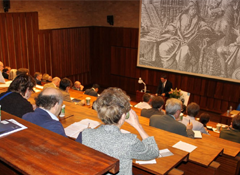
Rhodri welcomes delegates and introduces the conference themes
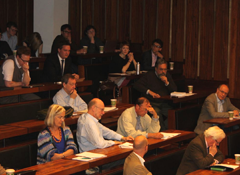
Our largest ever audience packs the lecture theatre
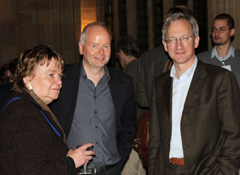
Constance Blackwell, Philip Beeley, and Howard Hotson
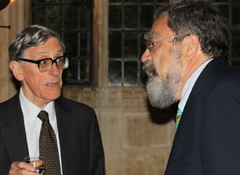
Sir Keith Thomas and Anthony Grafton at the Scaliger Reception
Particular attention was paid to the epistolary experiences of groups and networks rather than those of particular individuals – and the role of letters in constituting these communities of practice – and to the ways in which exchanges of letters coexisted with, supplemented, or competed with other kinds of knowledge production during the period. Delegates were also treated to a demonstration of our union catalogue of correspondence, Early Modern Letters Online (video now on our infrastructure page); no fewer than two publisher-sponsored drinks receptions toasting exciting new publications and partnerships (details here); and an array of quiches, sandwiches, and cakes of unusual deliciousness crafted by Trevor and Cristina from the Organic Deli Café.
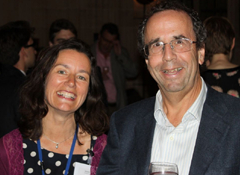
Miranda Lewis and Mordechai Feingold at the Scaliger Reception
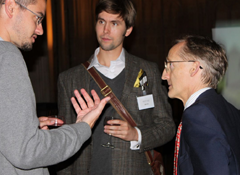
Leigh Penman, Alexander Farquhar, and Noel Malcolm
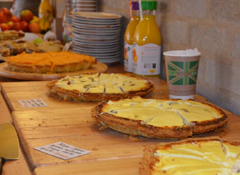
A conference marches on its stomach: artisan quiches
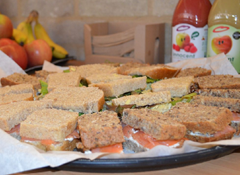
Sandwiches on home-made bread also exceeded scholarly expectations
Videos of most of the proceedings will be available shortly; in the meantime, for further information, including speaker profiles and abstracts, check out the conference microsite. Details of further events in 2013 and 2014 will also be available in the coming months; to stay informed, please join our mailing list.

 The
The 

 is after contributions on the following themes: ‘International news; networks of news; news in transmission; translating news; war reporting; news from beyond Europe; forms of news; orality/manuscript/print; the uses and afterlives of news; old (and recycled) news; images of news; news and institutions; news and the state; news and the city; news readers’.
is after contributions on the following themes: ‘International news; networks of news; news in transmission; translating news; war reporting; news from beyond Europe; forms of news; orality/manuscript/print; the uses and afterlives of news; old (and recycled) news; images of news; news and institutions; news and the state; news and the city; news readers’.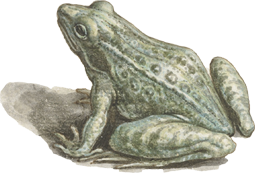 Our pertinacious (we’re running out of adjectives)
Our pertinacious (we’re running out of adjectives) 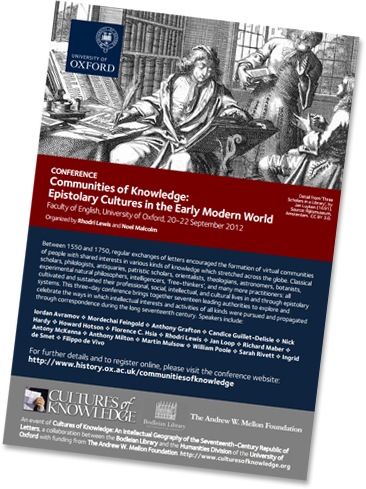









 Join
Join 